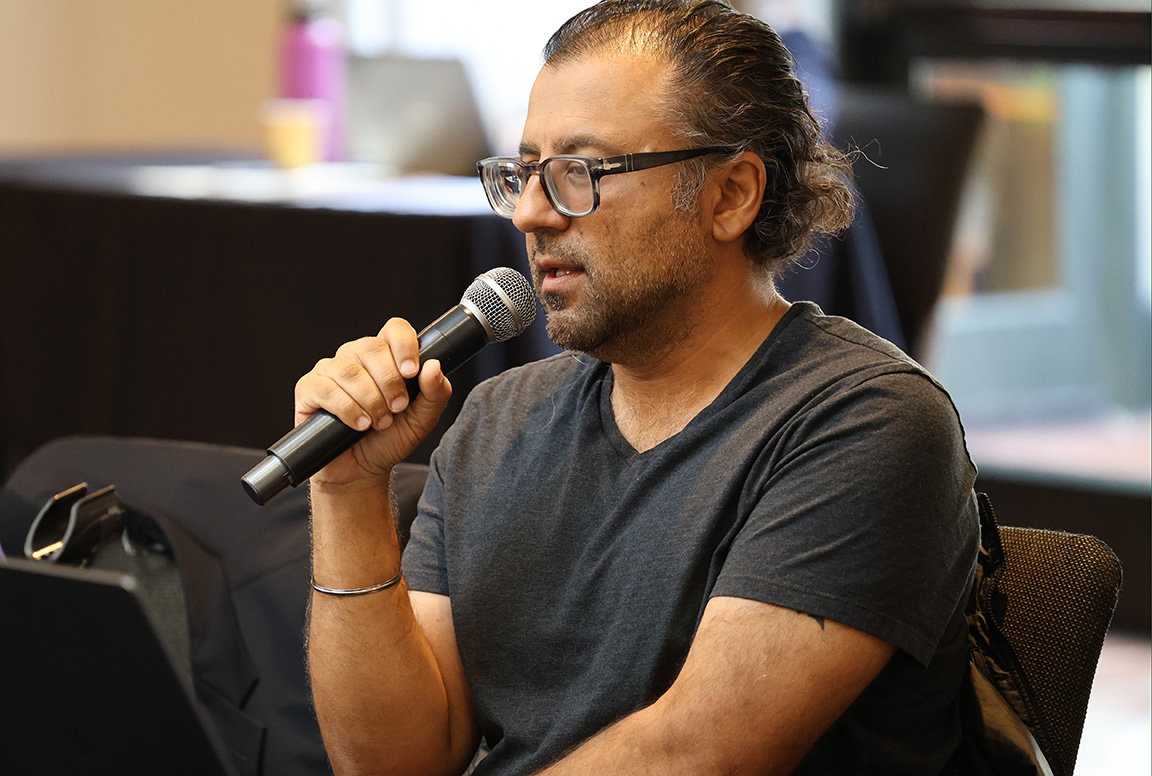
Varun Soni, J.D., Ph.D., dean of Religious and Spiritual Life at USC, addresses the chaplains’ meeting on April 30 at St. Paul’s Commons. Photos: Janet Kawamoto
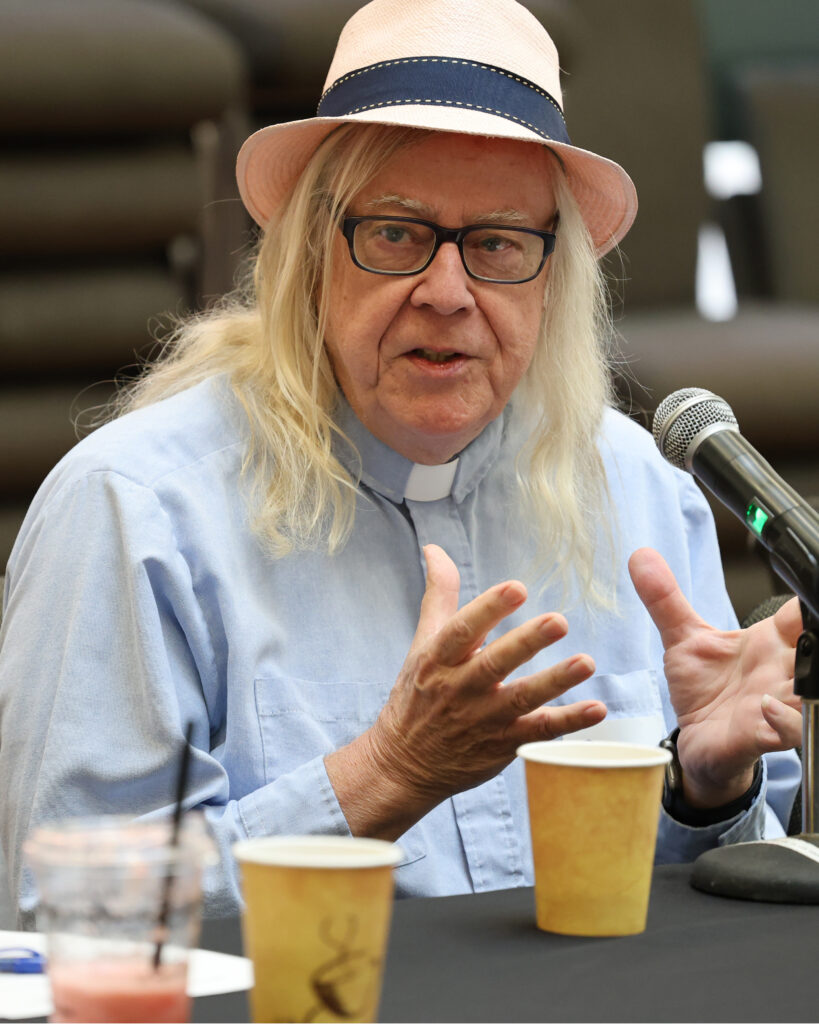
Glenn Libby, who has been a chaplain at several campus over three decades, chaired the April 30 meeting along with Bishop John Harvey Taylor.
[The Episcopal News] In an era of widespread unrest and distrust of mainline institutions, campus ministries provide crucial spiritual, relational, and practical resources for students, according to a gathering of chaplains from across the Los Angeles diocese at St. Paul’s Commons April 30.
Bishop John Harvey Taylor welcomed the chaplains, who serve campuses from Isla Vista to Irvine, and from Riverside to Los Angeles, as the genesis of “a think tank … to position campus ministry on a continuum that begins with childhood Christian education, youth ministry, campus ministry, young adult ministry.”
And while recent campus unrest also affords opportunities for student support and resources (see related story), Taylor said the meeting’s goal was to gather information in preparation for 2025 diocesan budget conversations, which are beginning this month.
“We have identified resources that may enable us to include in the 2025 budget, someone who would be a new kind of resource person to support those who are doing ministry with our relatively younger cohorts,” Taylor said.
The chaplains heard from Varun Soni, J.D., Ph.D., dean of Religious and Spiritual Life at USC, who spoke movingly of the challenges the USC community is facing, as well as the ways that faith groups can support young people who are showing increased stress and worry about their future.
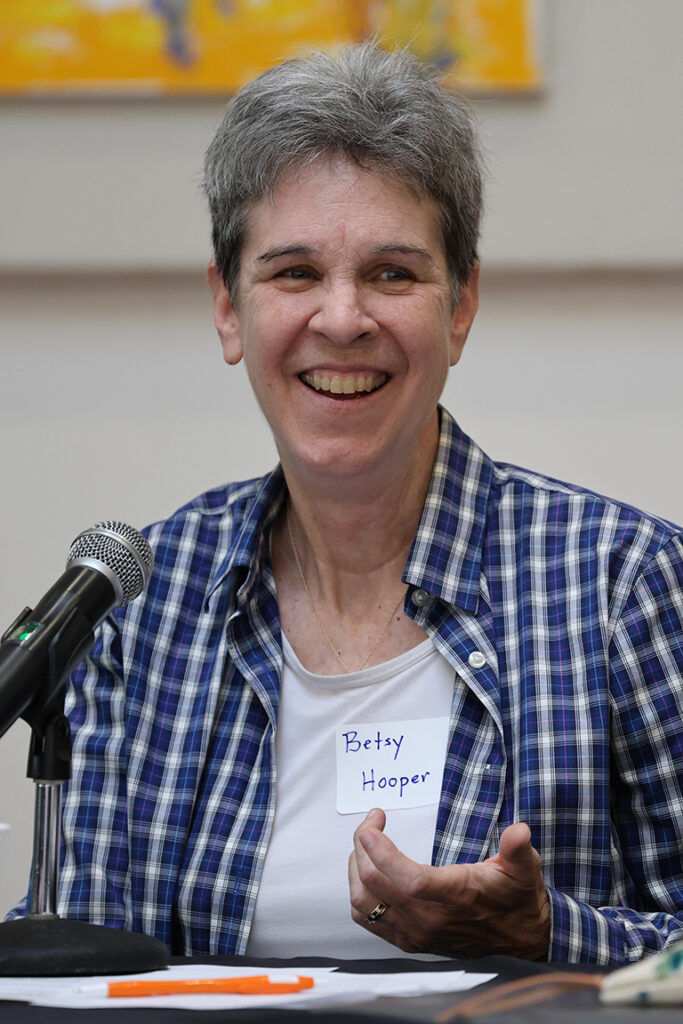
Betsy Hooper Rosebrook is dean of chaplains for the diocese, overseeing those serving in schools, colleges, universities, prisons and hospitals.
The chaplains will continue meeting collaboratively and hope to organize a summit with students later in the year. Their ministries are supported by the Very Rev. Betsy Hooper Rosebrook, dean of the chaplains, a position created last year, Taylor said.
The Rev. Glenn Libby, who has served at numerous campuses and is retiring in December after 29 years at USC, said chaplains have made “brave moves” away from former models of campus ministry. Such models – of a part-time chaplain offering a weekly meal, celebrating Eucharist, and leading bible study along denominational lines – have shifted into campus-specific creative ministries of presence among students with a diversity of faiths and also those with no faith traditions.
“I’m excited about us establishing a strong foundation going forward,” Libby said.
Student populations have also evolved, ranging in age from 18 to 55, said Methodist Deacon Jeanne Roe Smith, executive director of the nonprofit Wesley Foundations, a UCLA campus ministry partner with St. Alban’s Church in Westwood. “There is no one typical student,” she said. “Some are immigrants. Some are formerly incarcerated. Some are undocumented. Community is a basic need for all. All students deserve to share the abundance of creation and God.”
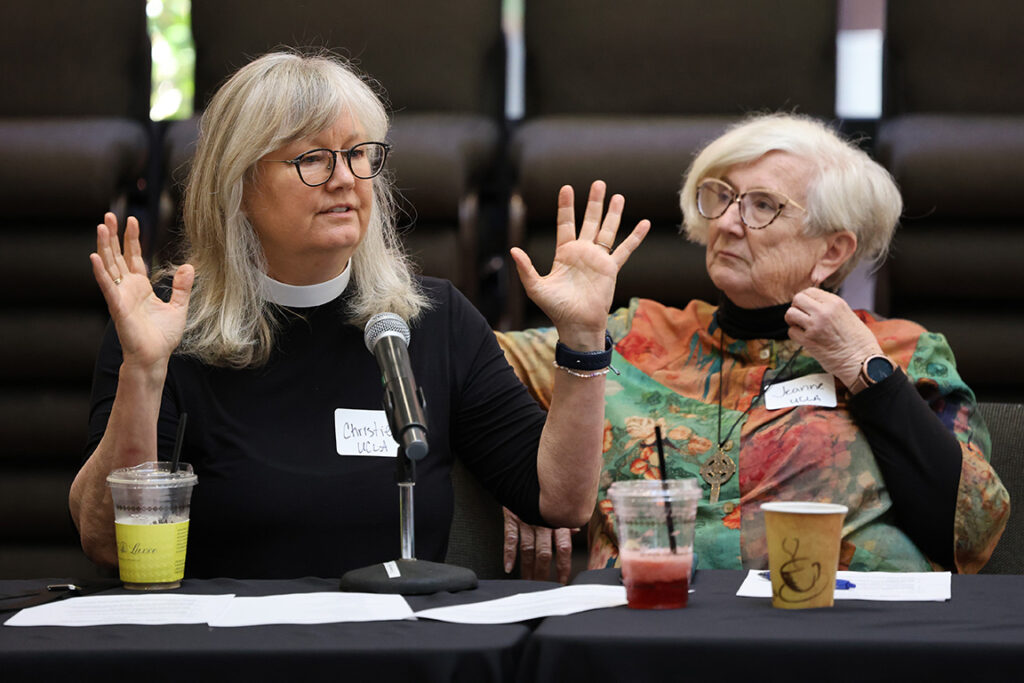
Episcopal Deacon Christie Mossman and Methodist Deacon Jeanne Roe Smith lead the chaplaincy program at UCLA.
Los Angeles
Some diocesan chaplaincies are in transition, and some are in post-pandemic recovery mode. All are attempting to address in some way student food and housing insecurity, as well as spiritual concerns.
For example, St. Alban’s Church in Westwood offered a much-needed “welcoming space” during the recent faculty and student walkout at UCLA, according to Episcopal Deacon Christie Mossman and Roe Smith.
The church’s proximity to campus meant “students could cross the street and turn off the noise,” Roe Smith said. “They needed a place to just go and sit and have a cup of coffee and be around people who are kind.
“It is important that they see it (the ministry) as a sanctuary for everyone,” she added. “Many students don’t identify with a specific tradition, but they recognize the care and comfort of something bigger than themselves, where there is compassion and kindness. That is how we offer Christ’s compassion, hope, relationship, inspiration, solidarity, and respond in new ways.”
Mossman said the ministry offers midday meditation and Thursday evening opportunities for theological reflection. “We have a reading, and then we provide a snack. Once a month, we do pizza.”

Mel Soriano is associate chaplain for Canterbury USC, which is centered at St. John’s Cathedral, Los Angeles.
St. Alban’s parishioners also glean food from a local farmer’s market for Monday distribution and to create both meals and community for students.
In some cases, traditional offerings work, said the Rev. Mel Soriano, associate priest at St. John’s Cathedral in Los Angeles who also serves as associate USC chaplain. While “the vast majority of students I am meeting today are not the typical, stereotypical USC students you might have imagined through the decades,” offering a contemplative service, and evening Compline, followed by food, has been tremendously popular. The next Compline service is scheduled for Sunday, May 5 at 8 p.m., he said.
“We’ve been doing that for 10 years. And that’s been a great way to offer some candlelit dark, a time for people to reflect and to be with each other. And there’s food afterwards.” Just showing up and engaging on campus is also hugely important, Soriano added.
Orange County
Another Methodist-Episcopal partnership, at Orange County’s UC-Irvine, offers a monthly “Community Table’ student-led meal, serving up connection and joy while attempting to address food insecurity, according to Pastor Cathie Capp of the University United Methodist Church.
The partnership began in 2019 when St. George’s Church in Laguna Hills approached Capp and asked to rent space for the ministry, Capp recalled. “I said, instead of renting you space, if you’ll receive a Methodist into your Canterbury Irvine program, let’s do this together.”
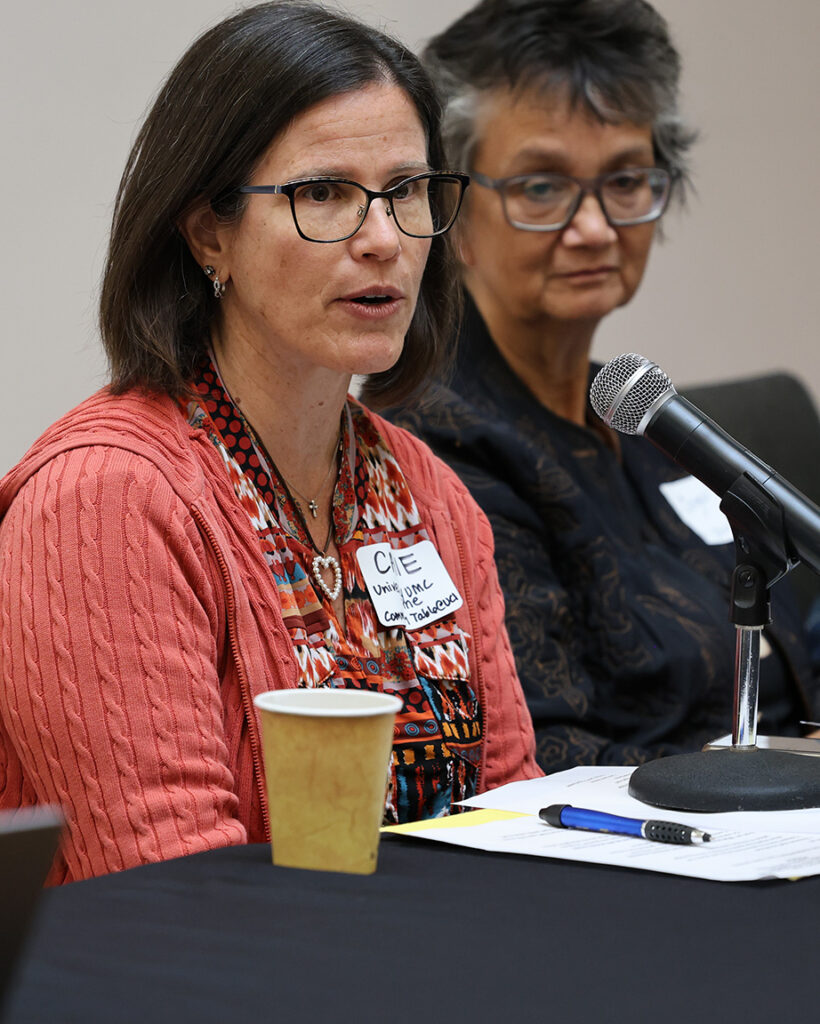
Methodist chaplain Cathie Capp, left, and Episcopal lay chaplain Joyce Swaving discuss the UC Irvine Canterbury program.
The ministry has since shifted from her church, located two miles from the campus, to “meeting students where they are, and not requiring anything other than they come in and grab food,” she said. “Some people come and grab food and leave. Some people come in and stay. There’s fun and joy. We play games, whether it’s trivia or Bingo.”
Seven student leaders publicize, organize and prepare meals, offered in the dining room space of a campus apartment complex. “We host a dinner and invite people to just be,” said Capp. “Anywhere from 20 to 28 students attend. And then we have games and prizes,” including In-N-Out Burger gift cards.
“We do Bingo; we paint pumpkins, even decorate cookies,” said Joyce Swaving, a St. George’s parishioner and lay chaplain. “We get together and laugh and share and just create a loving incubator of community.” The chaplains also serve as members of the UCI Canterbury board.
“We have managed to create a sustainable way of providing both ordained and lay leadership to support,” Libby said of the effort. The chaplaincy is also supported by other nearby Episcopal congregations. “It was a wild experiment, but it has worked. And now we’re in our third-generation student leader team. It’s been a really great model there.”
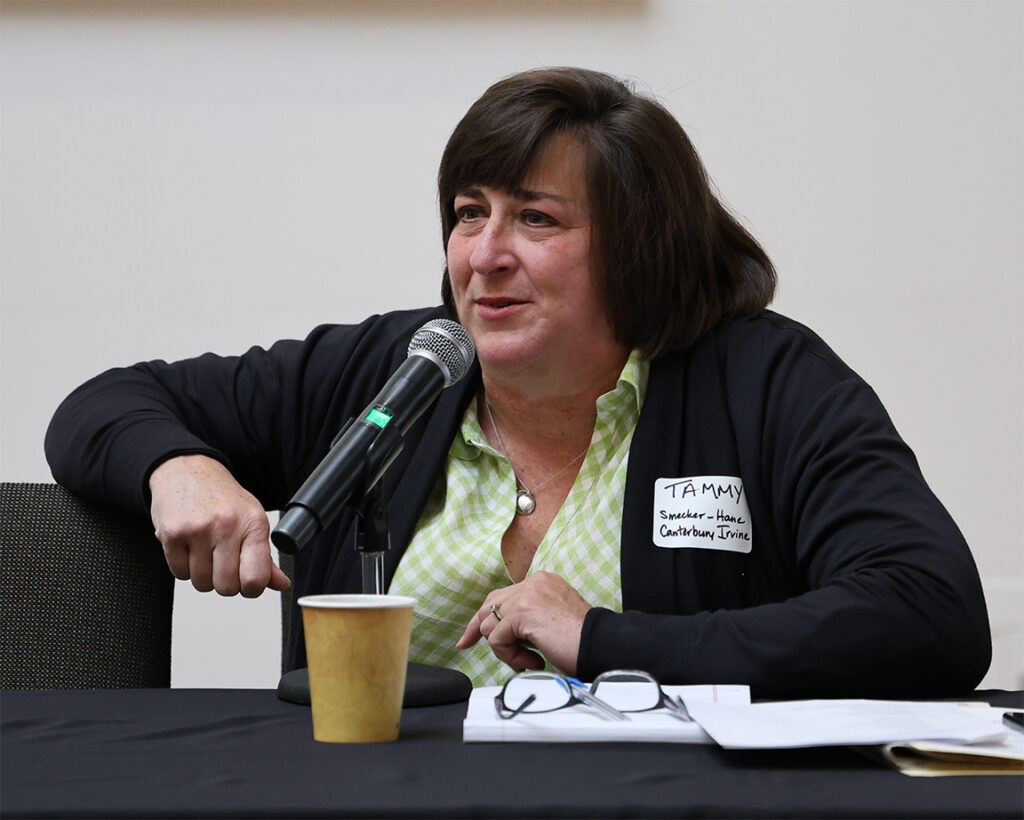
Tammy Smecker-Haynes, chair of the diocesan United Thank Offering and a member of St. Andrew’s Church in Irvine, serves on the board of Canterbury Irvine.
Tammy Smecker-Haynes, chair of the diocesan United Thank Offering and a member of St. Andrew’s Church in Irvine, agreed. “The students just weren’t into the old-fashioned stuff any more; the part-time chaplain model was dying out.
“There are a lot of students who are lonely. They want connection,” added Smecker-Haynes, a retired UCI professor of astrophysics. “Some are food insecure. We invite them in. We give them food. We give them community, and it’s been growing and growing.”
Training and empowering student leaders to express themselves and their autonomy is a vital part of the ministry, which also offers some scholarships to student leaders. For example, students organized a campus marathon and raised $5,000 for Habitat for Humanity, she said. “Once you get a critical mass of students, they begin opening up and will tell you what’s close to their hearts.”
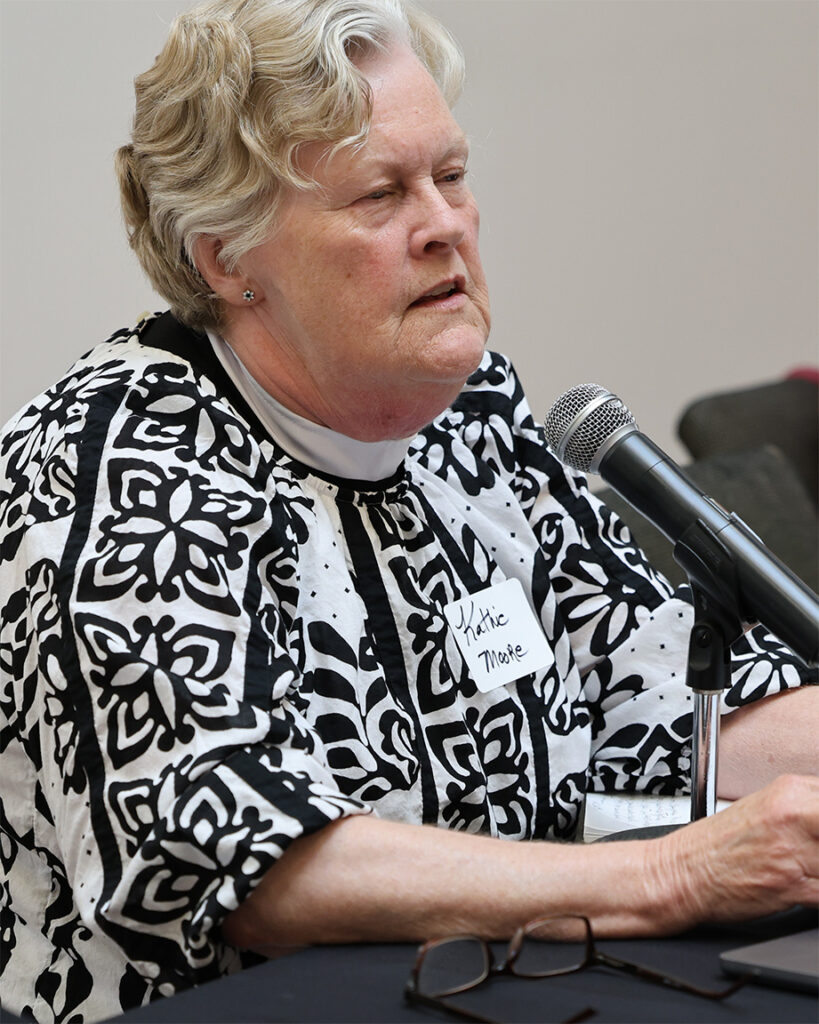
Kathleen Moore, Episcopal deacon, UC Santa Barbara professor of religious studies and associate humanities and fine arts dean, serves at St. Michael’s University Chapel in Isla Vista.
St. Mike’s, Isla Vista
At St. Michael’s University Church in Isla Vista, “we continue to maintain spirituality work groups to appeal to both intellectual and spiritual development of our students,” said the Rev. Kathleen Moore, deacon, who also serves as a UC Santa Barbara professor of religious studies and associate humanities and fine arts dean.
The ministry has been without a chaplain for a year, “and I’m just sort of informally keeping the lights on and inviting people in, with supply priests and having people come preach,” she said. About 40 people attend regular Sunday worship, “and many are students. But we also have staff and faculty and retired people who continue to come.”
Additionally, UC Santa Barbara composting interns collect food scraps from local restaurants and use the church campus for community gardening and composting. “There are many, very many ways over the years that we have created the connection in Isla Vista and on campus between St. Mike’s and our university,” she added. “I hope I’ve been able to minister to the needs of very many students.”
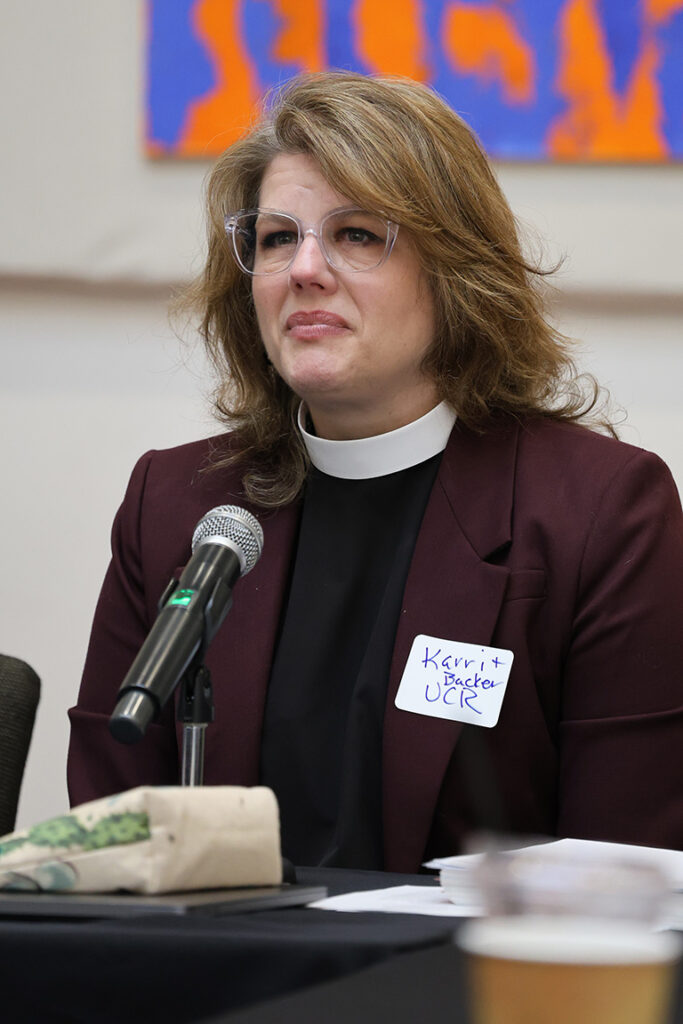
Karri Backer, vicar of St. George’s Church, Riverside, has been building a new ministry at UC Riverside.
St. George’s, Riverside
The campus ministry at St. George’s Church in Riverside has responded to food insecurity issues among students over the years, and in 2025 aims to create a “welcoming and affirming” Christian club on the UC-Riverside campus, with the assistance of a student intern, according to the Rev. Karri Backer, vicar.
“We’ve made a number of connections with students, and it’s really exciting,” Backer told the group. “At this point, at UCR, there are no Christian clubs on campus that are welcoming and affirming. I’m grateful to be starting to connect with staff and faculty and departments on campus, to see what might be helpful to them and how we can support them.”
Backer said she has been meeting with chaplains across the church, via a Virginia Theological Seminary effort, “Thriving in Ministry.” Many participants are still in pandemic recovery mode, and beginning to jumpstart their campus ministries, which is difficult work, Backer added.
“It is heart work,” Roe Smith said. “What we do matters; being present, being available to students matters more than you might recognize. We may feel overwhelmed. We may feel inadequate. We may feel under-resourced. But, sometimes, just showing up and having coffee on campus with a student is where it begins.
“What we do doesn’t just matter to students, it matters to the campus. It matters to churches and to the world. We are doing heart work; we are called to hold that space, to create these conversations and offer reminders that hope, and faith and love exist and persist and it can be difficult. We are the messengers of that, that Jesus calls us to be.”
